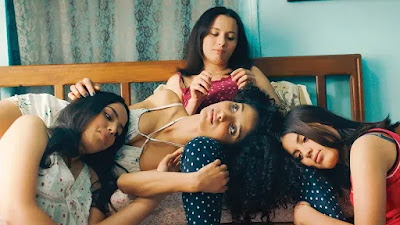What we come to watch, then, is reenactment - and a form of reenactment markedly different from that deployed in, say, Errol Morris's documentaries, at all stages foregrounding the processes of rehearsal and blocking out. Along with the obvious theatre, there is an element of therapy in the mix, as if Ben Hania's original pitch to her participants was show me how and where the bad men of this story (who extend beyond Daesh, encompassing absent fathers, indifferent boyfriends and shrugging, brutish police) hurt you. This wave of hybrid films predates the #MeToo movement, but you can see how its methods marry up with that movement: they allow a filmmaker to show their working and demonstrate consent. No-one was strongarmed into doing anything unwanted or untoward on this set - it was a collective effort, completed under the most collegiate of conditions. (Ben Hania affords her girls a freedom that may well be lacking elsewhere in Tunisian society: her mock-up of the family home could serve as the dictionary definition of a safe space.) Yet here the result is a perilously talky sort of film: we hear first the women's testimony, then witness it converted into lines of filmable dialogue. It also, I think, generates needless obfuscation and confusion: two speakers are often heard to represent the same voice, and scenes go awry in the filming (as when an actor or participant breaks character), carrying us even further away from the crux of these matters.
I emerged from Four Daughters wondering anew whether the movies haven't been badly misled by modish academic notions about performance - and more precisely by the idea we're all of us acting, even when appearing in a documentary and being specifically asked to speak our truth. I can see why certain colleagues continue to swoon over the hybrid form: it's easily described as clever, new and/or headily postmodern. Yet its cleverness strikes me as counterproductive in the main, setting layers of overthinking between the viewer and the truth of these situations, while allowing artifice to overshadow a film's subjects, and whatever they have to impart. (These films aim for transparency, and land on opacity.) That's some achievement here, given that Ben Hania is filming possibly the most photogenic family in the Middle East - a clan whose cheekbones, flowing hair and gleaming teeth would give the Kardashian-Jenners a run for their covergirl money. (The real daughters become indistinguishable from the actors, and vice versa.) I suspect this may well be one reason for Four Daughters' festival success, and its Oscar nomination: these girls would look great on any red carpet, and have clearly now been well-schooled in the photo opportunity. But how much of their story, and their suffering, can we honestly take away with us, when the storytelling is aiming for a fudge and a muddle?
Four Daughters opens today in selected cinemas.

No comments:
Post a Comment